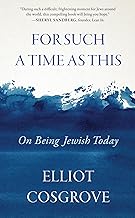For Such a Time as This: On Being Jewish Today by Rabbi Elliot Cosgrove; Harvest (c) 2024; ISBN 9780063-417472; $29. Publication date: Sept. 24, 2024
By Rabbi Michael Leo Samuel

 CHULA VISTA, California — Rabbi Cosgrove’s book delves into the intricate and evolving nature of Jewish identity in the wake of the October 7th Hamas attack on Israel, an event that has reignited global antisemitism and marked a pivotal moment in Jewish history.
CHULA VISTA, California — Rabbi Cosgrove’s book delves into the intricate and evolving nature of Jewish identity in the wake of the October 7th Hamas attack on Israel, an event that has reignited global antisemitism and marked a pivotal moment in Jewish history.
This tragedy has prompted a profound reassessment of Jewish identity, highlighting a transition from what Cosgrove terms “Genesis Jews” to “Exodus Jews.” This shift signifies a move from an identity grounded in divine blessing and cultural belonging to one shaped by external threats and the need for self-defense.
Cosgrove contrasts these two identities: Genesis Jews, who see their Jewishness as a matter of personal choice and divine connection, and Exodus Jews, whose identity is forged by persecution and the struggle for survival. Before the attacks, many American Jews identified as Genesis Jews, comfortably rooted in their identity by choice rather than necessity. However, the brutal events of October 7th have catalyzed a shift, compelling them to adopt a more defensive posture, reminiscent of the Exodus narrative, where survival against external hostility becomes paramount.
A central theme in the book is the double standard that Cosgrove argues has been exposed by these events—a world that often overlooks Jewish suffering, forcing American Jews into a deeper reckoning with their identity, marked by fear, anger, and a renewed sense of solidarity.
One particularly compelling chapter is “Our Tribal Moment,” where Cosgrove explores the ongoing debate within the Jewish community about whether Jewish identity is primarily ethnic and cultural, or if it is fundamentally religious. This debate has roots in the European emancipation of Jews and is exemplified by the ongoing “Who is a Jew?” question that has gained prominence, particularly through figures like Rabbi M. M. Schneersohn. Cosgrove suggests that this is a critical issue for contemporary Jews to confront, as it impacts the very core of Jewish identity. Though there are no simple solutions, he believes that engaging with this issue can bring greater clarity and understanding.
Cosgrove ultimately advocates for a balanced approach, one that embraces both the internal pull of Jewish tradition and the external challenges posed by adversity. He argues that this dual perspective is crucial for addressing the challenges of today and for cultivating a resilient Jewish future.
In the face of adversity, Cosgrove observes that Jewish communities have strengthened their bonds, rallying together for support and solidarity. He also tackles the persistent and troubling question of antisemitism, offering a nuanced examination of its roots and its ongoing presence in the world. The book further explores the role of Israel and Zionism in American Judaism, acknowledging both their capacity to unify and their potential to divide.
Cosgrove provides practical guidance for navigating Jewish identity in a sometimes hostile world, stressing the importance of maintaining Jewish traditions and values while also considering the ethical responsibilities of Jewish life today. Through storytelling and references to ancient teachings, he offers timeless principles that resonate with contemporary issues.
By sharing personal experiences, Cosgrove adds depth and relatability to his reflections. His book serves as a thoughtful guide for those grappling with the complexities of modern Jewish life, encouraging readers to embrace their heritage, confront challenges with resilience, and find joy and hope in their Jewish identity.
*
Rabbi Michael Leo Samuel is spiritual leader of Temple Beth Shalom in Chula Vista, California.